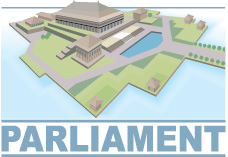Columns
Speaker stands firm against SC while LG poll’s law sails thro’
A landmark ruling by Speaker Chamal Rajapaksa and Parliament’s approval of significant changes to the Local Authority election law in the country, dominated Parliamentary sittings this week.

The lengthy statement by the Speaker, lasting nearly an hour, on Tuesday, came in the wake of the ruling by the Supreme Court, when preliminary objections were raised in connection with a petition filed, challenging the constitutionality of the Divineguma Bill last month.
The Court had ruled that, whether a copy of a petition filed in the Supreme Court challenging a Bill, is sent to the Speaker or the Secretary General of Parliament, would be one and the same, and would not be unconstitutional.
However, the Speaker differed strongly with this interpretation of Article 121 (1) of the Constitution given by the three-member Supreme Court Bench, saying that, it is emphatic in his mind, having studied the matter carefully, that “the Supreme Court has erred in reading the unambiguous provisions relating to the Speaker in the Constitution, which, if allowed to remain in its present form, will cause irreparable impairment to procedure and practice of Parliament,”
The Speaker was supported in his affirmation of Parliamentary supremacy and the authority of the Speaker, as envisaged in the Constitution, by all party leaders who were consulted before finalising the statement.
However, despite the disagreement with the Supreme Court’s interpretation, the Speaker reiterated several times, the need to maintain the cordiality that exists between the Executive, Legislature and the Judiciary.
“On the part of the Legislature, it is imperative that cordiality and harmony is maintained in our democratic edifice with the other two pillars in the tripod, namely, the Executive and the Judiciary, to implement the Constitution effectively, in the interest of the People,” he said.
The same day, Economic Development Minister Basil Rajapaksa re-introduced the controversial Divineguma Bill to the House, after the Speaker announced that he had been notified by the President of the Bill’s endorsement by all the Provincial Councils.
The same Bill was presented by the Government last August, but was later withdrawn, after the Supreme Court determined it needed the sanction of the Provincial Councils before it became law. Since the re-introduction of the Bill, several more petitions have been filed challenging its constitutionality.
Meanwhile, on Wednesday, Parliament unanimously approved amendments to the Local Government (LG) Elections law in the country, which does away with the “manape” system. The Bill was passed at the Committee Stage, after it had stalled for more than a year, due to disagreements between different parties, on how the newly introduced mixed system of electing remembers to LG bodies should be formulated.
While the Bill was passed, to elect 70% of the members under the Westminster (First-Past-the-Post) system and 30% of the members under the Proportional Representation (PR) system, the Government agreed to change this equation to 60-40, once the Delimitation Committee to be appointed shortly, to recommend the demarcation of the wards for the local authorities areas, finalises its report.
“We have agreed to several more amendments in principle, and these will be introduced once the Committee finalises its report in about a year,” Local Government and Provincial Councils Minister A.L.M. Athaullha said.
The Bill got the support of all members of the House, with special mention being made of the role played by Chief Government Whip Minister Dinesh Gunawardena who headed the Parliamentary Select Committee on Electoral Reforms that made this recommendation on how to change the election laws.
The Government also introduced the Appropriation Bill for 2013 to Parliament on Tuesday. President Mahinda Rajapaksa will present the Budget on November 8.
Follow @timesonlinelk
comments powered by Disqus




















